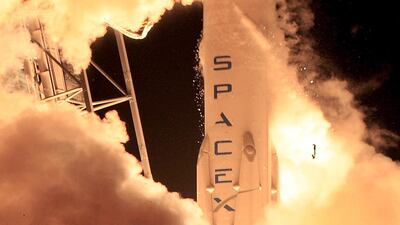The Billionaire Jeff Bezos’ space-exploration company has launched and landed an unmanned rocket while testing a parachute failure, a key step in checking the safety of its New Shepard vehicle before sending it to space with astronauts aboard.
The mission was the fourth time the same Blue Origin rocket flew to suborbital space and returned to Earth intact. It was the first incorporating a planned failure of landing equipment for its capsule, to test redundancies meant to protect the vehicle and passengers.
The capsule, which would carry astronauts on a manned mission, landed successfully in West Texas on Sunday at 9:46am local time, after two instead of a typical three parachutes deployed. The capsule and the rocket split after take-off and landed separately.
The rocket itself uses wings and refires its engine to slow its descent. It landed successfully before the capsule, at 9:43, about 7 minutes after take-off. It was the first Blue Origin launch broadcast live, on the internet. New Shepard made its first test flight in April of last year.
Mr Bezos, who founded Amazon.com, and his space rival, the billionaire Elon Musk, want to reduce the cost of space exploration by building rockets that are reusable like aircraft. Blue Origin and Mr Musk’s Space Exploration Technologies have conducted frequent tests in the past couple of years.
SpaceX rockets can be used to deliver people, supplies and equipment to space. The smaller Blue Origin rockets would be used to bring tourists to the edge of space for a few minutes of weightlessness. The company aims to send crews into space next year and expects to sell seats to tourists in 2018 for between US$250,000 and $350,000.
paceX’s used rocket booster crashed while trying to land on an ocean barge.
The attempt came minutes after the Falcon 9 rocket successfully launched two satellites from Cape Canaveral, Florida.
Mr Musk said via Twitter that there was a problem with one of the three engines used to slow the first-stage booster for landing. He said it may be the hardest crash of all. Early attempts also failed.
SpaceX’s first successful landing on the platform off Florida’s east coast came in April, with two more last month. It also landed a 15-storey booster in December on land at Cape Canaveral Air Force Station.
Mr Musk plans to recycle boosters to lower launch costs. They normally are discarded in the ocean.
business@thenational.ae
Follow The National's Business section on Twitter

